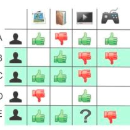User historical interaction data is the primary signal for learning user preferences in collaborative filtering (CF). However, the training data often exhibits a long-tailed distribution, where only a few items have the majority of interactions. CF models trained directly on such imbalanced data are prone to learning popularity bias, which reduces personalization and leads to suboptimal recommendation quality. Graph Neural Networks (GNNs), while effective for CF due to their message passing mechanism, can further propagate and amplify popularity bias through their aggregation process. Existing approaches typically address popularity bias by modifying training objectives but fail to directly counteract the bias propagated during GNN's neighborhood aggregation. Applying weights to interactions during aggregation can help alleviate this problem, yet it risks distorting model learning due to unstable node representations in the early stages of training. In this paper, we propose a Post-hoc Popularity Debiasing (PPD) method that corrects for popularity bias in GNN-based CF and operates directly on pre-trained embeddings without requiring retraining. By estimating interaction-level popularity and removing popularity components from node representations via a popularity direction vector, PPD reduces bias while preserving user preferences. Experimental results show that our method outperforms state-of-the-art approaches for popularity bias correction in GNN-based CF.
翻译:暂无翻译




